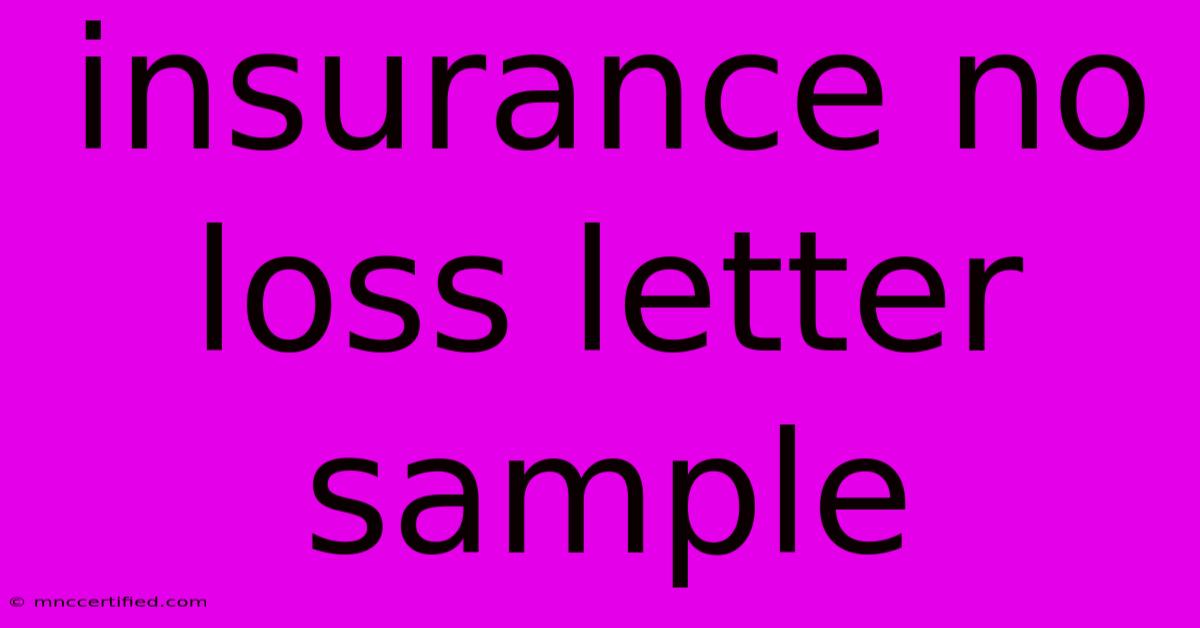Insurance No Loss Letter Sample

Table of Contents
Insurance No Loss Letter Sample: A Comprehensive Guide
Are you looking for an insurance no loss letter sample? Understanding the purpose and proper format of this crucial document can save you time and potential headaches. This comprehensive guide provides sample letters, explains their importance, and offers tips for crafting your own effective no loss letter.
What is an Insurance No Loss Letter?
An insurance no loss letter, also known as a certificate of no claims, is a formal document confirming that you haven't made any claims on your insurance policy within a specified period. This letter is frequently requested by:
- Mortgage lenders: They often require proof of consistent no-claims history before approving a mortgage application or refinancing.
- Insurance companies: When switching providers, your new insurer might request a no-claims letter from your previous insurer.
- Employers: Some employers might request this as part of their background check process, particularly for roles requiring driving or handling valuable assets.
- Rental agencies: Landlords may ask for this to verify your responsible history and assess your risk profile.
Why is a No Claims Letter Important?
A no claims letter demonstrates your responsible insurance history. It’s a testament to your careful habits and reduced risk profile, benefiting you in several ways:
- Better insurance premiums: A consistent no-claims history often leads to lower insurance premiums in the future.
- Easier approvals: Providing a no-claims letter streamlines applications for mortgages, jobs, and rentals.
- Improved credibility: It builds trust and credibility with lenders and other parties who review your application.
Sample Insurance No Loss Letter Templates
Here are a few sample insurance no loss letter templates you can adapt. Remember to replace the bracketed information with your specific details.
Template 1 (Formal):
[Your Name] [Your Address] [Your Phone Number] [Your Email Address]
[Date]
[Insurance Company Name] [Insurance Company Address]
Subject: Request for No Claims Letter
Dear Sir/Madam,
This letter is to formally request a no-claims letter confirming that I have not filed any claims against my insurance policy, [Policy Number: XXXXXX], for the period of [Start Date] to [End Date].
My policy covers [Type of Insurance, e.g., Homeowners, Auto].
Thank you for your time and assistance in providing this important document.
Sincerely, [Your Signature] [Your Typed Name]
Template 2 (For a specific recipient):
[Your Name] [Your Address] [Your Phone Number] [Your Email Address]
[Date]
[Recipient Name] [Recipient Title] [Company Name] [Company Address]
Subject: No Claims Letter - [Policy Number: XXXXXX]
Dear [Recipient Name],
This letter confirms that I have not filed any claims under my insurance policy, number [Policy Number: XXXXXX], with [Insurance Company Name] between [Start Date] and [End Date].
This letter is required for [Reason for requesting the letter, e.g., mortgage application].
Please let me know if you require any further information.
Sincerely, [Your Signature] [Your Typed Name]
Tips for Writing Your Own No Loss Letter
- Be clear and concise: Use straightforward language and avoid ambiguity.
- Provide all necessary information: Include your policy number, dates of coverage, type of insurance, and the reason for requesting the letter.
- Proofread carefully: Ensure there are no grammatical errors or typos.
- Maintain a professional tone: Use a formal tone and appropriate business letter formatting.
- Specify the date range: Clearly state the period for which you're requesting confirmation of no claims.
- Keep a copy for your records: Always retain a copy of the letter and any supporting documentation.
Off-Page SEO Considerations
To improve the ranking of this article, consider these off-page SEO strategies:
- Link building: Reach out to relevant websites and blogs in the insurance and finance industries to secure backlinks to this article.
- Social media promotion: Share the article on relevant social media platforms to increase visibility and drive traffic.
- Guest blogging: Contribute articles to other websites in your niche, including a link back to this article.
- Forum participation: Engage in online forums related to insurance and answer questions where this article could be helpful.
By following these guidelines and utilizing both on-page and off-page SEO techniques, you can create a comprehensive and effective resource that ranks well on search engines and helps users find the information they need. Remember to always consult with your insurance provider for specific requirements and procedures.

Thank you for visiting our website wich cover about Insurance No Loss Letter Sample. We hope the information provided has been useful to you. Feel free to contact us if you have any questions or need further assistance. See you next time and dont miss to bookmark.
Featured Posts
-
Ronaldo Brace Al Nassr Vs Al
Nov 26, 2024
-
Can I Cancel My Insurance Claim
Nov 26, 2024
-
Director On Jon Benet Ramsey Netflix Documentary
Nov 26, 2024
-
Federal Case Dismissal Trump Smith
Nov 26, 2024
-
Del Reys Glasgow Stadium Show Announced
Nov 26, 2024